I_名词性物主代词
- 格式:ppt
- 大小:225.50 KB
- 文档页数:5

名词性物主代词英语中的物主代词可分为形容词性物主代词和名词性物主代词。
形容词性物主代词:单数形式:my(我的),your(你的),his /her/ its(他的、她的、它的)。
复数形式:our(我们的),your(你们的),their(他们的)。
名词性物主代词:单数形式:mine(我的xx ),yours(你的xx ),his /hers /its(他的xx 、她的xx 、它的xx)。
复数形式:ours(我们的xx),yours(你们的xx),theirs(他们的xx)。
代词表格:名词性物主代词的用法:1.形容词性物主代词起形容词的作用,用在名词前。
(黑体为形容词性物主代词)e.g : 1. This is my book. 这是我的书。
2.名词性物主代词起名词的作用。
(黑体为名词性物主代词)e.g : This book is mine. 这本书是我的。
3.注意:在使用名词性物主代词时,必须有特定的语言环境,也就是要省略的名词大家已经知道,已经提起过。
e.g : It's hers. 是她的。
(单独使用大家不知是怎么回事,不可以这样用。
)There is a book. It's hers. 这有本书。
是她的(书)。
(这里的 hers=her book )只有上文提及了某个名词,才会知道名词性物主代词指代的事物。
4.为避免重复使用名词,有时可用“名词性物主代词”来代替“形容词性物主代词+名词”的形式。
e.g : My bag is yellow, her bag is red, his bag is blue and your bag is pink.为避免重复使用 bag,可写成 My bag(形容词性) is yellow, hers(名词性=her bag ) is red, his(名词性=his bag) is blue and yours(名词性=your bag) is pink.5.名词性物主代词可以用在介词 of的后面,相当于“of+名词所有格”。
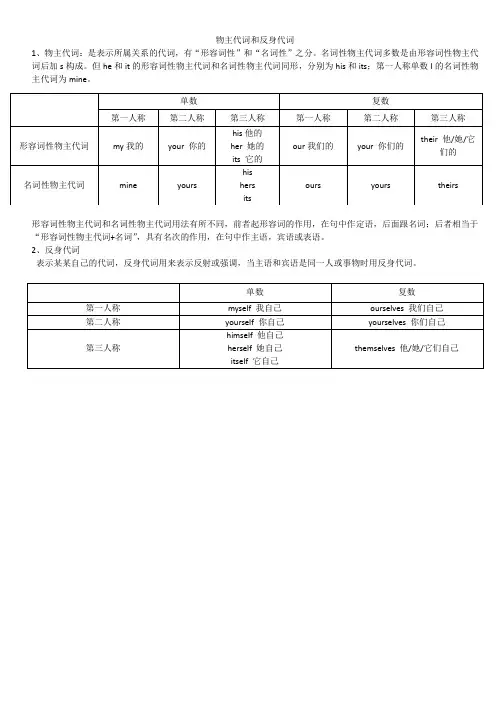
物主代词和反身代词
1、物主代词:是表示所属关系的代词,有“形容词性”和“名词性”之分。
名词性物主代词多数是由形容词性物主代词后加s构成。
但he和it的形容词性物主代词和名词性物主代词同形,分别为his和its;第一人称单数I的名词性物主代词为mine。
形容词性物主代词和名词性物主代词用法有所不同,前者起形容词的作用,在句中作定语,后面跟名词;后者相当于“形容词性物主代词+名词”,具有名次的作用,在句中作主语,宾语或表语。
2、反身代词
表示某某自己的代词,反身代词用来表示反射或强调,当主语和宾语是同一人或事物时用反身代词。

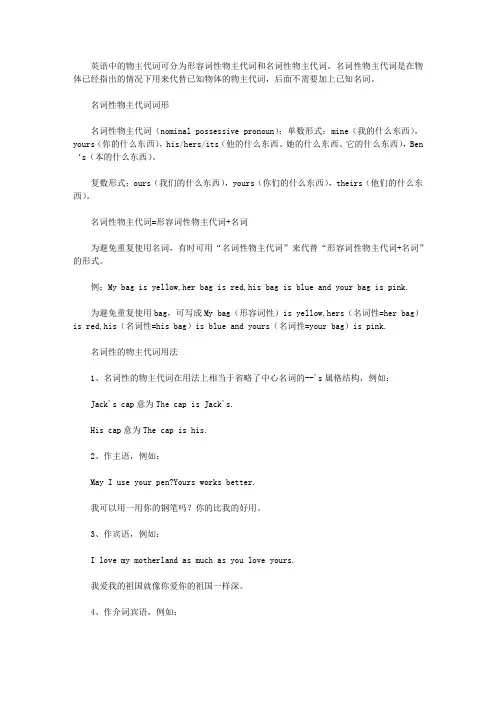
英语中的物主代词可分为形容词性物主代词和名词性物主代词。
名词性物主代词是在物体已经指出的情况下用来代替已知物体的物主代词,后面不需要加上已知名词。
名词性物主代词词形名词性物主代词(nominal possessive pronoun):单数形式:mine(我的什么东西),yours(你的什么东西),his/hers/its(他的什么东西、她的什么东西、它的什么东西),Ben ‘s(本的什么东西)。
复数形式:ours(我们的什么东西),yours(你们的什么东西),theirs(他们的什么东西)。
名词性物主代词=形容词性物主代词+名词为避免重复使用名词,有时可用“名词性物主代词”来代替“形容词性物主代词+名词”的形式。
例:My bag is yellow,her bag is red,his bag is blue and your bag is pink.为避免重复使用bag,可写成My bag(形容词性)is yellow,hers(名词性=her bag)is red,his(名词性=his bag)is blue and yours(名词性=your bag)is pink.名词性的物主代词用法1、名词性的物主代词在用法上相当于省略了中心名词的--'s属格结构,例如:Jack's cap意为The cap is Jack's.His cap意为The cap is his.2、作主语,例如:May I use your pen?Yours works better.我可以用一用你的钢笔吗?你的比我的好用。
3、作宾语,例如:I love my motherland as much as you love yours.我爱我的祖国就像你爱你的祖国一样深。
4、作介词宾语,例如:Your should interpret what I said in my sense of the word,not in yours. 你应当按我所用的词义去解释我说的话,而不能按你自己的意义去解释。
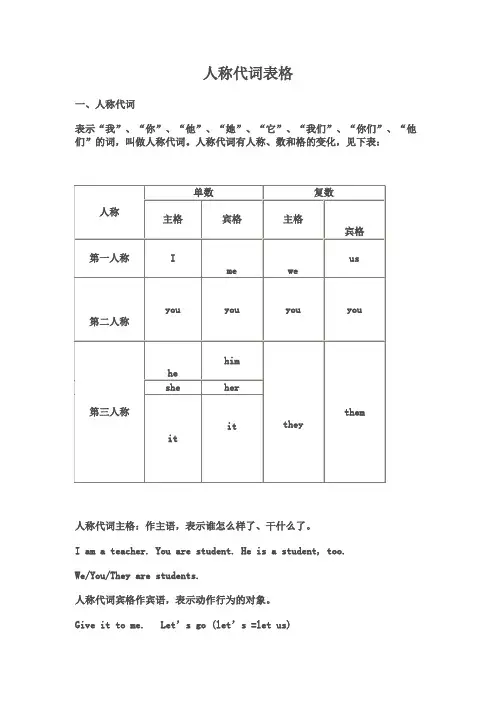
人称代词表格
一、人称代词
表示“我”、“你”、“他”、“她”、“它”、“我们”、“你们”、“他们”的词,叫做人称代词。
人称代词有人称、数和格的变化,见下表:
人称代词主格:作主语,表示谁怎么样了、干什么了。
I am a teacher. You are student. He is a student, too.
We/You/They are students.
人称代词宾格作宾语,表示动作行为的对象。
Give it to me. Let’s go (let’s =let us)
二、物主代词
表示所有关系的代词叫做物主代词,也可叫做代词所有格。
物主代词分形容词性物主代词和名词性物主代词二种,其人称和数的变化见下表。
形容词性物主代词(my/your/his/her/its/our/their)+名词
而名词性物主代词则相单于形容词性物主代词+名词,故其后不必加名词。
如:
Is this your book?
No,,it isn’t,it’s hers(her book)
This pen is mine.。
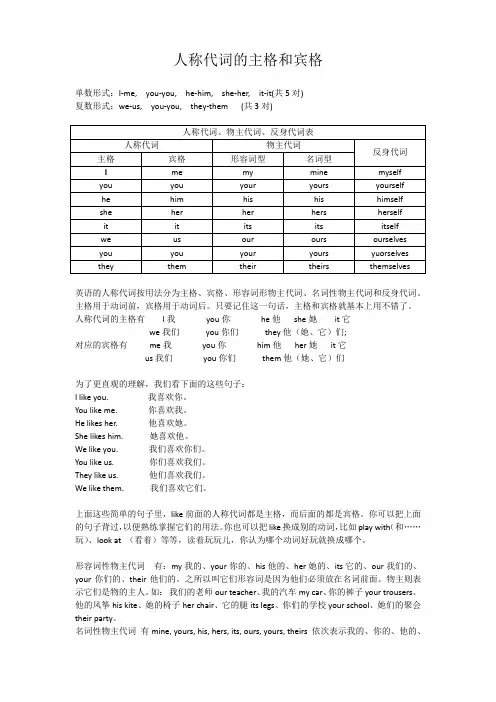
人称代词的主格和宾格单数形式:I-me, you-you, he-him, she-her, it-it(共5对)复数形式:we-us, you-you, they-them (共3对)英语的人称代词按用法分为主格、宾格、形容词形物主代词、名词性物主代词和反身代词。
主格用于动词前,宾格用于动词后。
只要记住这一句话,主格和宾格就基本上用不错了。
人称代词的主格有I我you你he他she她it它we我们you你们they他(她、它)们;对应的宾格有me我you你him他her她it它us我们you你们them他(她、它)们为了更直观的理解,我们看下面的这些句子:I like you. 我喜欢你。
You like me. 你喜欢我。
He likes her. 他喜欢她。
She likes him. 她喜欢他。
We like you. 我们喜欢你们。
You like us. 你们喜欢我们。
They like us. 他们喜欢我们。
We like them. 我们喜欢它们。
上面这些简单的句子里,like前面的人称代词都是主格,而后面的都是宾格。
你可以把上面的句子背过,以便熟练掌握它们的用法。
你也可以把like换成别的动词,比如play with(和……玩)、look at (看着)等等,读着玩玩儿,你认为哪个动词好玩就换成哪个。
形容词性物主代词有:my我的、your你的、his他的、her她的、its它的、our我们的、your你们的、their他们的。
之所以叫它们形容词是因为他们必须放在名词前面。
物主则表示它们是物的主人。
如:我们的老师our teacher、我的汽车my car、你的裤子your trousers、他的风筝his kite、她的椅子her chair、它的腿its legs、你们的学校your school、她们的聚会their party。
名词性物主代词有mine, yours, his, hers, its, ours, yours, theirs 依次表示我的、你的、他的、她的、它的、我们的、你们的、他(她、它)们的。

形容词物主代词:单数形式:my(我的),your(你的),his /her/ its(他的、她的、它的)。
复数形式:our(我们的),your(你们的),their(他们的)。
名词物主代词:单数形式:mine(我的xx),yours(你的xx),his /hers /its(他的xx、她的xx、它的xx)。
复数形式:ours(我们的xx),yours(你们的xx), theirs (他们的xx)。
编辑本段含义介绍:1. 形容词性物主代词起形容词的作用,用在名词前。
(黑体为形容词性物主代词)例:1. This is my book. 这是我的书。
2. We love our motherland. 我们热爱我们的祖国。
2. 名词性物主代词起名词的作用。
(黑体为名词性物主代词)例:1. Look at the two pencils. The red one is yours and the blue one is mine. 看那两支铅笔,红的是你的,蓝的是我的。
2. He likes my pen. He doesn’t likehers. 他喜欢我的钢笔。
不喜欢她的。
3. 注意:在使用名词性物主代词时,必须有特定的语言环境,也就是要省略的名词大家已经知道,已经提起过。
例: It's hers. 是她的。
(单独使用大家不知是怎么回事,不可以这样用。
)There is a book. It's hers. 这有本书。
是她的(书)。
(这里的hers=her book)只有上文提及了某个名词,才会知道名词性物主代词指代的事物。
4. 名词性物主代词=形容词性物主代词+名词为避免重复使用名词,有时可用“名词性物主代词”来代替“形容词性物主代词+名词”的形式。
例:My bag is yellow, her bag is red, his bag is blue and your bag is pink. 为避免重复使用bag,可写成My bag(形容词性) is yellow, hers(名词性=her bag)is red, his(名词性=his bag) is blue and yours (名词性=your bag) is pink.编辑本段用法:1)物主代词既有表示所属的作用又有指代作用.例如:John had cut his finger; apparently there was a broken glass on his desk. 约翰割破了手指,显而易见,他桌子上有个破玻璃杯。
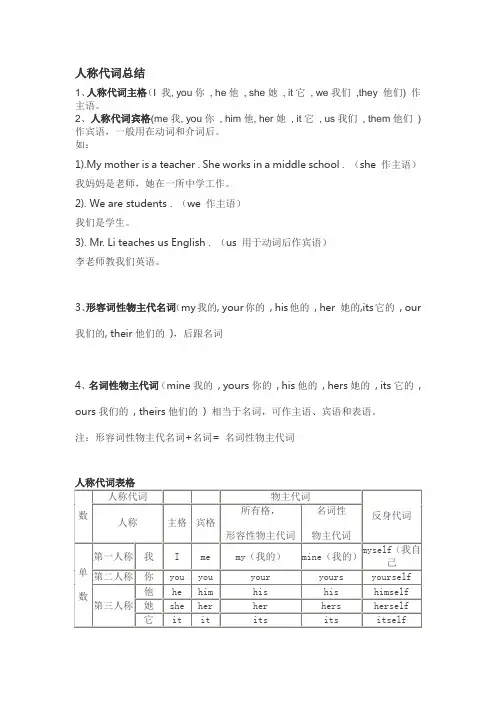
人称代词总结
1、人称代词主格(I 我, you你, he他, she她, it它, we我们,they 他们) 作主语。
2、人称代词宾格(me我, you你, him他, her她, it它, us我们, them他们)作宾语,一般用在动词和介词后。
如:
1).My mother is a teacher . She works in a middle school . (she 作主语)
我妈妈是老师,她在一所中学工作。
2). We are students . (we 作主语)
我们是学生。
3). Mr. Li teaches us English . (us 用于动词后作宾语)
李老师教我们英语。
3、形容词性物主代名词(my我的, your你的, his他的, her 她的,its它的, our 我们的, their他们的),后跟名词
4、名词性物主代词(mine我的, yours你的, his他的, hers她的, its它的, ours 我们的, theirs他们的) 相当于名词,可作主语、宾语和表语。
注:形容词性物主代名词+名词= 名词性物主代词。

指示代词:this,that,those,these人称代词:I,me,them,they,he,his等形容词性物主代词:your,my,his,its等名词性物主代词:mine,his,its,hers,yours,ours等反身代词:themselves,yourself,yourselves,himself,herself,itself,ourselves等不定代词:another,other,some,many,much, little,anything,somebody,no,such等关系代词:who,whom,which,that,as等疑问代词:what,whatever,which,who等I.单句填空:用适当的代词填空或者根据汉语提示填空。
1. By the way, who will teach ___pop music next term? ( we )2. Both Pingping and Beibei have done ___homework.3. I’m sorry to say ___ o f your answers are correct.4. There’re tall buildings on ___ side of the street.5. Is ___ any use talking to him about it?6. Since you don’t have a dictionary here, why not use ___?7. This book is not mine. It belongs to ___.8. The children seem to be enjoying ___ very much.9. Though ___ is a long way from here, we’ll do our best to reach there in time.10. We don’t consider ___ necessary for them to move into that house.11. ___ is a great and glorious country.1. I intended to play basketball with a friend in the next class, but unfortunately_______couldn’t spare me even one minute.2. Jim’s father bought ______ some interesting toys on _______ birthday.3. My grandma still treats me like a child. She can’t imagine _______ grown up. (重庆)4. The boy promised ______mother never to lie to ______again. (全国)5. Kate and her sister went on holiday with a cousin of _______. (全国)6. This kind of washing machine can work to ___________.7. Our neighbours gave us a baby bird yesterday that hurt _______ when it fell from its nest. (湖南)8. Isn’t it amazi ng how the human body heals ____ after an injury? (江西)9. My daughter often makes a schedule to get __________ reminded of what she is to do in the day.10. Tom felt that he knew everybody’s business better than they knew it_______. (全国)11. As to creating a cleaner environment, I think ___ citizen of ____ should take action.12. To save class time, our teacher has _______ students do half of the exercises in class and complete the other half for our homework.13. It was hard for one to learn English in a family, in which __________ of the parents spoke the language. (北京)14. I know a lot about the lady because _______ of her parents are my colleagues.15. To know more about the British Museum, you can use the Internet or go to the library, or ______.16. Our monitor is active in organizing the graduation party, which _____ of us are looking forward to.17. As the busiest woman in Norton, she made _______her duty to look after all the other people’s affairs in that town. (湖南)18. I’d appreciate ______ if you would like to teach me how to use the computer. (山东)19. We had a picnic last term and it was a lot of fun, so let’s have _____one this month.20. Both sides have accused the ______ of breaking the contract. (上海)21. It is our belief _________ improvements in health care will lead to a stronger, more prosperous economy. (浙江)22. Was it Hua Mountain ________ you climbed last week?23. I just wonder what ________is that makes him so excited. (山东)24. He do esn’t have ____ furniture in his room—just an old desk. (陕西)25. The school’s music group will be giving a big show tomorrow night and two_______ on the weekend. (安徽)26. He has made a lot of films, but _______ good ones. (北京)27. Although he's wealthy, he spends ______ on clothes. (全国)28. Some people like to stay at home on Sunday, but ________like to go to the cinema.29. First, it is important to recognize what kind of person you are and which special qualities make you different from everyone _______.(湖北)30. The book is of great value. __________ can be enjoyed unless you digest it. (福建)1 A woman on the bus shouted, “Oh, dear! It ‘s ______ (I )”.2Raise your leg and let 5. stay in the air for seconds.3 Some of my friends who had been there before said________ was a wonderful holiday destination.4 A few hours earlier, I’d been at home in Hong Kong, with ______(it) choking smog.5 Now it occurred to ___25___ that his farm had much potential and that the death of the cow was a bit of luck.1.I patiently walked to the library, took my seat and did some deep breathing to help relax ____. (广州二模)2. The little boy pulled______ right hand out of the pocket and studied a number of coins in it. (深一模)3. …the driver did ___________ to help and even stopped once to pick up more passengers.(汕头二模)4.If you give your children … that they can never do anything quite right, then they will regard as unfit or unable persons. (深圳罗湖)5. Some 134,000 Chinese students went to study abroad, and 120,000 of were self-funded students.(茂名二模)6.Firstly, we must understand the language when we hear spoken.(佛山一模)Keys: 1. myself 2. his 3. nothing 4. themselves 5. them 6. itKeys: I. 1. he 2. him; his 3. me 4. his; her 5. theirs 6. itself 7. itself 8. itself 9. herself 10. themselves 11. every; us 12. us 13. neither 14. both 15. both 16. all 17. it 18. it 19. another 20. other 21. that 22. that 23. it 24. much 25. more 26. few 27. little 28. others 29. else 30. Nothingme/mine it it its him。
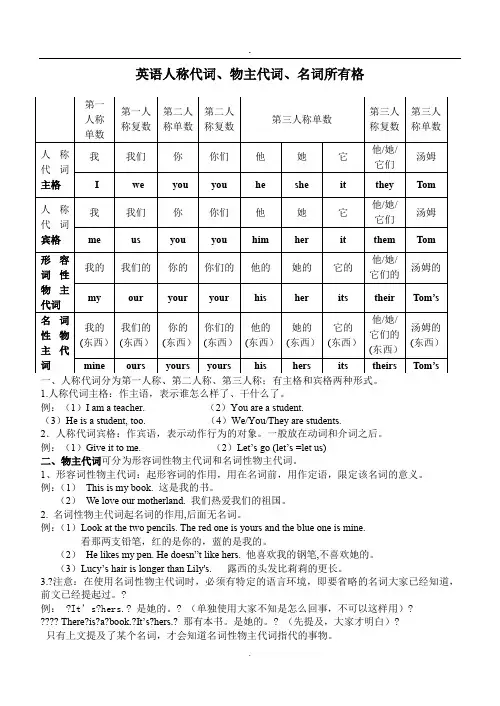
英语人称代词、物主代词、名词所有格1.人称代词主格:作主语,表示谁怎么样了、干什么了。
例:(1)I am a teacher. (2)You are a student.(3)He is a student, too. (4)We/You/They are students.2.人称代词宾格:作宾语,表示动作行为的对象。
一般放在动词和介词之后。
例:(1)Give it to me. (2)Let’s go (let’s =let us)二、物主代词可分为形容词性物主代词和名词性物主代词。
1、形容词性物主代词:起形容词的作用,用在名词前,用作定语,限定该名词的意义。
例:(1)This is my book. 这是我的书。
(2)We love our motherland. 我们热爱我们的祖国。
2. 名词性物主代词起名词的作用,后面无名词。
例:(1)Look at the two pencils. The red one is yours and the blue one is mine.看那两支铅笔,红的是你的,蓝的是我的。
(2)He likes my pen. He doesn”t like hers. 他喜欢我的钢笔,不喜欢她的。
(3)Lucy’s hair is longer than Lily's. 露西的头发比莉莉的更长。
3.?注意:在使用名词性物主代词时,必须有特定的语言环境,即要省略的名词大家已经知道,前文已经提起过。
?例:?It’s?hers.? 是她的。
? (单独使用大家不知是怎么回事,不可以这样用)? ???? There?is?a?book.?It’s?hers.? 那有本书。
是她的。
? (先提及,大家才明白)?只有上文提及了某个名词,才会知道名词性物主代词指代的事物。
4.?名词性物主代词=形容词性物主代词+名词??名词性物主代词在一定情况下可以用“形容词性物主代词+名词”来转换;有时为避免重复使用名词,也可用“名词性物主代词”来代替“形容词性物主代词+名词”的形式。

its的名词性物主代词形式是什么
its的名词性物主代词和形容词性物主代词是一样的,都是its.英语中的物主代词可分为形容词性物主代词和名词性
物主代词。
名词性物主代词是在物体已经指出的情况下用来代替已知物体的物主代词,后面不需要加上已知名词。
形容词性物主代词在句只用作定语;名词性物主代词则不能用作定语,但可以用作主语、宾语、表语、连用of作定语。
要注意英语与汉语使用物主代词的差异。
汉语说“我校”,说成英语应是my school,而不能是 I school;汉语说“他父亲”,说成英语应是his father,而不能是 he father;同样地,汉语说“你先生”,说成英语应是your husband,而不能是 you husband。
另外,有些在英语中必用的物主代词在汉语中往往无需表达。
主语有I、he、she、we、they、you、it。
宾语有me、you、him、her、it、us、you、them。
形容词性物主代词有my、your、his、her、its、our、their。
名词性物主代词有mine、yours、his、hers、its、ours、theirs。
i的形容词性物主代词和名词性物主代词是什么
I是人称代词,其形容词性物主代词为my,名词性物主代词为mine。
形容词性物主代词的功能相当于一个形容词,后面必须跟有名词。
名词性物主代词本身就相当于一个名词,可用来做主语或宾语,后无需再加名词。
扩展资料
I形容词型物主代词:
是:My
形容词性物主代词又称形物代,它后面必须跟相关的名词
人称代词的主格有:I,you,he,she,it,we,they
人称代词的宾格有:me,you,him,her,it,us,them
人称代词的形容词性物主代词有:my,your,his,her,its,our,their.
人称代词的'名词性物主代词有:mine,yours,his,hers,its,ours,theirs
形容词性物主代词:
形容词性物主代词有:my(我的),your(你的、你们的),our(我们的),his(他的),her(她的),its(它的),their (他们的)。
形容词性物主代词具有形容词的特性,常放在名词前面作定语,表明该名词所表示的人或物是"谁的"或xxx belongs to sb。
形容词性物主代词:
单数形式:my(我的),your(你的),his /her/its(他的、她的、它的)。
复数形式:our(我们的),your(你们的),their(他们的)。
形容词性物主代词具有形容词的特性,常放在名词前面作定语,表明该名词所表示的人或物是"谁的"或xx belongs to sb。